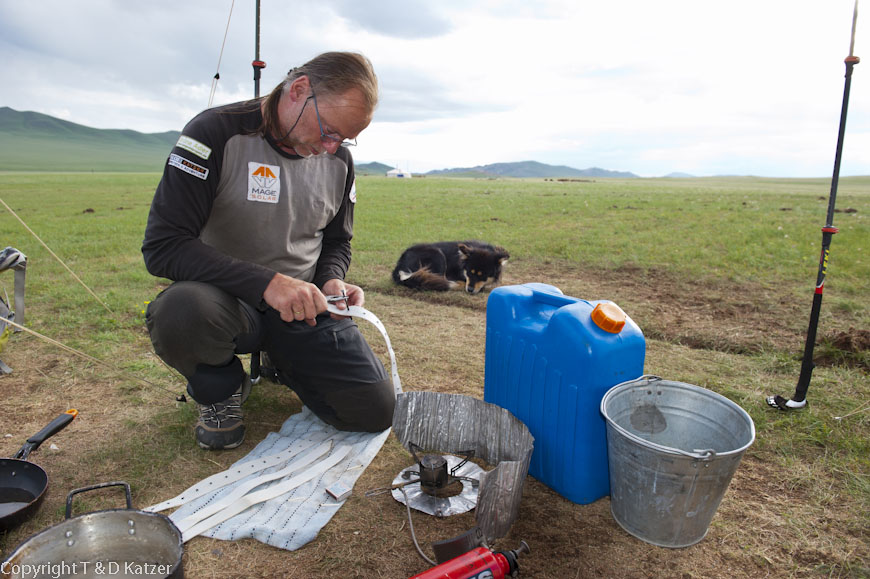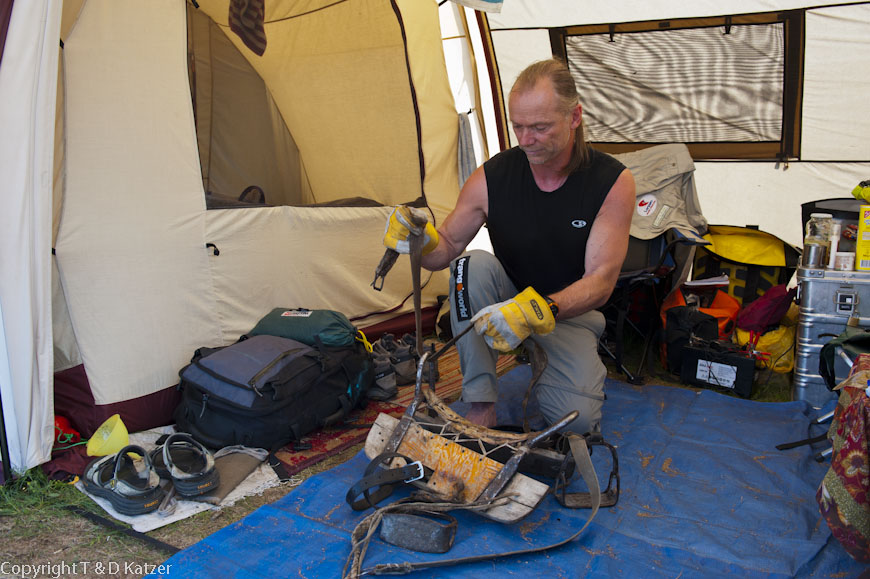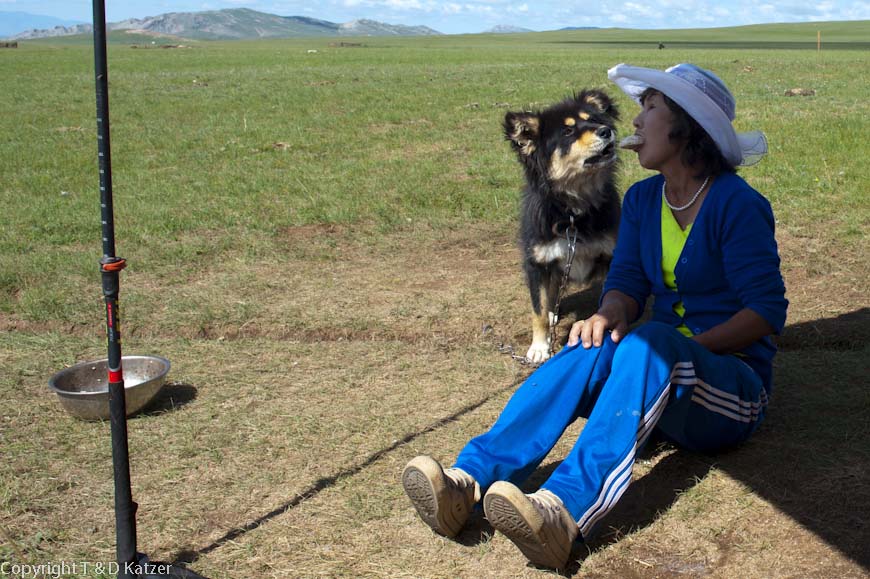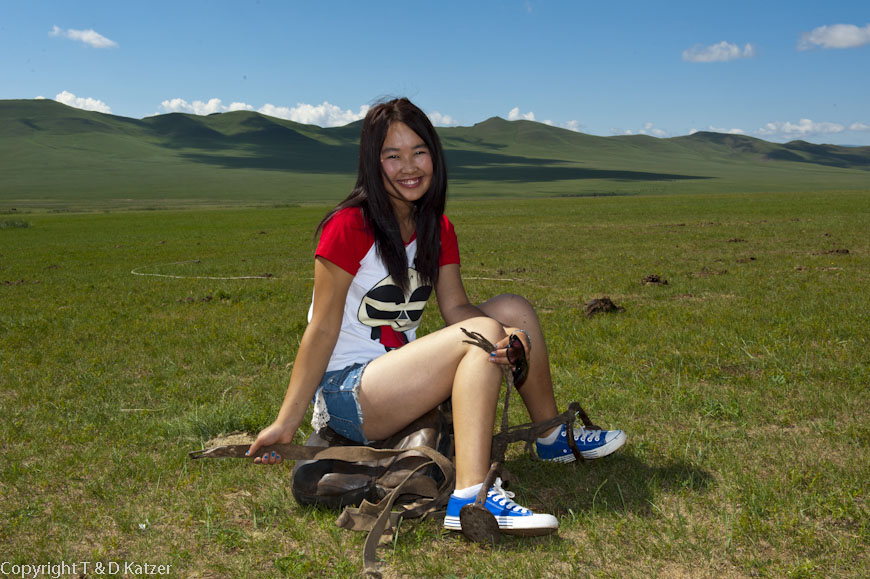
True friends are worth more than all the money in the world – Victims of the flames – Sattelbau
N 49°42'773'' E 100°11'497''
Day: 364-370
Sunrise:
05:36/05:44
Sunset:
21:14/21:06
Total kilometers:
1722
Soil condition:
Grass
Temperature – Day (maximum):
25 °C/30 °C
Temperature – day (minimum):
14 °C/20 °C
Temperature – Night:
6 °C/10 °C
Latitude:
49°42’773”
Longitude:
100°11’497”
Maximum height:
1492 m above the Meef




As was to be expected, Bilgee has indeed canceled. According to Togtokh, he was blindsided when he heard about his pay cut. It didn’t matter that we would have provided the food for him and his children during the entire trip. Of course, he didn’t know about the presents we would have loved to give him at the end of the trip. The tent alone, in which he slept during the trips and which he liked and would have used enthusiastically for his hunting excursions, would have been more than double his wages. We would have gladly handed over some of the important and expensive equipment such as headlamps, rubber and winter boots, pots, buckets, cups, woks, canisters, tin boxes etc. to him. Out of friendship and gratitude. Well, greed has triumphed once again. And it’s good to have found out his true motivation.
Meanwhile, Bilgee will go into the mountains and pick wild berries with his children. “If I make jam from it and sell it on the street, I earn much more than you do,” were his sobering words for us. After living closely together for six months, riding through a harsh country in extreme weather, experiencing endless things, we thought we had developed a friendship that went beyond money. The trip with his children would have been a give and take. A vacation trip that could certainly have been a nice farewell. But money was the deciding factor in the end. We are not angry with him for this, at most disappointed, because money is not only decisive in Mongolia but in the whole world, in all situations and social classes. It shows us once again how important it is to have friends who stick by you and help you out of a desire to help. Friends who do not think money-oriented. Anyone who has such friends can count themselves lucky, because they are worth more than all the money in the world. During our travels, we have often found such true treasures of humanity, regardless of skin color or race. Some of them live in Germany, others in distant countries with which we are still in contact. Although we made a lot of effort, such a friendship has not developed after a year in Mongolia. Too bad, but we are still here and the miracle can still happen. Nevertheless, we are not just here to make friends. That would be or is a wonderful side effect of traveling and life. Above all, however, we are here to experience the country in all areas, to explore and experience it for ourselves. This also includes the breathtaking, uniquely beautiful landscape with its truly extreme weather conditions and, of course, its inhabitants. The mix of everything gives us an impression and an insight into a country.
In the evening, a Russian four-gun (four-wheel drive bus) suddenly stops in front of our tent. We are delighted to be able to welcome Roelof. We met Roelof just under a year ago when we left Erdenet with our horses. He was traveling with a jeep and a tourist and could hardly believe he was meeting foreigners on their way to the taiga to spend the winter there with the Tuwa. Because he seemed very likeable during the short conversation, Tanja kept in loose text message contact. Just yesterday she wrote to him again and asked where he was. “I’m in Mörön.” “Oh, our camp is only about 10 kilometers from the city. If you fancy a visit, we’d be delighted,” Tanja invited him. Now he is sitting in front of our tent with two Dutch tourists and two pretty Mongolian girls called Munhzul and Nyamargal, who call themselves Zulaa and Njamka. We have a lively chat and talk roughly about the experiences of the past year.
“Don’t worry too much. They stole a horse from me and a car from you,” he says with a laugh. “A car? How’s that?” I ask. “I had a lovely, reliable driver who had been working for me for a year. Because of my tourist business, I needed my own four-gun. I gave my driver €7,000 to buy a used one. He procured not one but two. The great thing was that he registered one of the two buses in his name. So he got himself a four-gun and left my little company without saying goodbye. Because I trusted him completely, I gave him the money without a receipt. I had nothing on him. A year later, he called me again and asked if I had a job for him, as if nothing had ever happened.” “What? That’s unbelievable.” “Not really. This is Mongolia. They cheat you, rip you off and don’t hold grudges.” “Of course he doesn’t hold a grudge. He was the culprit,” I object indignantly. “Yes, but everything is different here. I no longer buy cars but rent them. That’s safer. However, it can happen that a driver cancels the evening before the round trip without giving a reason. It’s happened several times and gets me into big trouble every time.” “And you still want to live here?” asks Tanja. “I am married to a Mongolian woman. Her family is already starting to take advantage of us, but so far I have it under control. I don’t know what the future will bring. We’ll see,” replies the Dutchman cheerfully. “What do you mean about the family?” I ask. Oh, many foreigners who live here not only feed their wives and children but the whole clan. Sooner or later, everyone wants something from you.
A friend of mine wanted to sell Dutch cheese in Ulan Bator.” “Surely a gap in the market,” I interrupt, thinking of the country’s one-sided food supply. “Absolutely. Well, my friend owned several cows and actually produced fantastic cheese. Now his cows and his money are gone. He’s hiding from the money-hungry family in a small rented apartment in Ulan Bator.”
Victims of the flames
We laugh a lot that evening. The visit is a pleasant change for us. Above all, meeting people from the same culture who understand us. In the course of the lively conversation, it turns out that Njamka, who works for Roelof from time to time, is quite taken with our Mogi. “We’ve been looking for a good home for him for months. A place where he will be well,” says Tanja. “I would love to have him. My mother has a dog, but she would like a second guard dog because she is often alone,” says the sports teacher. “Oh great. If you don’t mind, I’ll come and visit you in the next few days and take a look at your home?” “I would be delighted to have you visit,” she replies.
We learn that Roelof has recently built and furnished a new hut for Njamka’s mother because it burnt down completely a few months ago. “Wow, a magnanimous act,” I say. “I always wanted a laptop from Roelof. I’d been bugging him about it for a long time. He was finally willing to buy me one when I heard about my mother’s misfortune. I don’t need a laptop anymore. I need a house for my mom. She’s homeless, I cried, which is why Roelof spontaneously built us a new home and saved us from complete ruin,” the young woman says, beaming at Roelof. “It only took a week,” Roelof interjects. “Just one week?” asks Tanja. “Yes. I’m a trained carpenter and joiner. The girls helped a lot. It’s a small hut of about 20 square meters, but I think the family will get through the winter.” “Certainly,” says Njamka. “You have to work through everything,” jokes the Dutchman with a laugh. “I love working for you and will never forget what you have done for my family,” she says with such gratitude in her voice that my heart softens.
“How much did the house cost?” I ask. “With the furnishings, around 5 million tugrik (€3,030). But it’s not finished yet. We still have a few things to improve before winter arrives,” says Roelof. “So Nyamka has to work for you for at least a year?” “Well, we don’t see it that close,” he laughs in reply. “What was the cause of the fire? Did you find out?” “Yes, it was an electric hotplate. Probably a short circuit in the cable. My mother wasn’t at home when it happened. She was shopping at the market. When she came back, our house was on fire. We couldn’t save anything. My mother’s instruments such as the guitar and the horse-headed violin were also destroyed by the flames. Honestly, without Roelof we wouldn’t have known how to go on. He even bought a guitar so that Badamsuren can make music again. That’s really important for them,” says Njamka.
“What do you do for Roelof?” I ask. “We’re going on a three-week round trip in a few days. They are customers of mine from Holland. They have three children between the ages of ten and thirteen who are also coming with us. Njamka will stay in the camp and look after the little ones so that they have a bit more freedom and can visit a monastery. She is very good with children. I’m glad to have her for this task,” explains Roelof because Njamka doesn’t speak English very well.
Saddle construction
Because Bilgee is no longer coming, we will not continue our journey with our horse-drawn cart as planned, but will travel the 400 kilometers to Erdenet with pack horses. However, as our horses were getting pressure sores from the saddles, we were forced to reorganize the trip and replace four saddles. A time-consuming, labor-intensive process.
Tanja comes back from Mörön in the evening and has brought a Mongolian saddle frame made of wood. I look at the thing skeptically. Our neighbor Ilchelaugsuren also sells us his old saddle frame. Because he has been rounding up his animals on his moped for several years, he no longer needs it and lets us have the rotten thing for 20,000 Tugrik. (12,-€). Nyamka and her mother Badamsuren put in a request for a Russian saddle at the market in Mörön. Russian saddles are somewhat more comfortable than Mongolian wooden saddles. Its frame consists of two wooden panels screwed to two iron brackets. A seat cushion rests on it. Such a saddle comes from a long forgotten time, but is still the non plus ultra in Mongolia today. Although it is almost impossible to get hold of used Russian saddles in the region around Mörön, the announcement is heard on the market.
Njamka, her sister Zulaa and mother Badamsuren turn up unexpectedly at our camp in a minibus. They bring along an old shepherd who wants to sell us his Russian saddle. We use the time to get to know Mogi and Badamsuren. Without question, the meeting is love at first sight. Badamsuren puts a cookie in her mouth, throws herself on the floor and stretches her face towards our dog. Mogi can’t believe what he’s being offered and impetuously tears the cookie from her lips. To everyone’s delight, the woman repeats the game several times. “He likes me,” she says triumphantly. I don’t want to spoil their joy, so I’ll refrain from saying; Mogi likes all people who give him food, especially if it’s cookies.
Over the next few days I will be busy fitting the saddle racks with new straps. These are also not available ready-made with buckle, clasp and holes, but have to be made individually. To make the holes in the ribbons, I heat a nail on our stove, grab it with the tongs and burn them in. The hands drill, grind and bind for all they’re worth. In order to adapt the wooden frames ergonomically to the horse’s back, they must be shaped with a wooden file. The backs of Sar, Tenger and Bor serve as a template. Whenever necessary, I use the file again to rework. It is exhausting but satisfying work.
At the same time, we are trying to sell our horse-drawn cart. So far without success. Saraa says that people no longer have any money after the Naadam. “One spends it and it jumps into the other’s pocket. Money is always available. It flows from left to right. If someone needs a car like this, they’ll find it,” I reply confidently. Our neighbor Ilchelaugsuren offers 200,000 to 250,000 Tugrik (121,- € to 152,- €) instead of the desired 650,000 Tugrik (394,- €). Better a bird in the hand than a pigeon on the roof,” says Tanja and wants to sell the car a few days later for the ridiculous price. Unfortunately, Ilchelaugsuren has now changed his mind, Mongolian style, and no longer wants to buy it.
We look forward to your comments!

